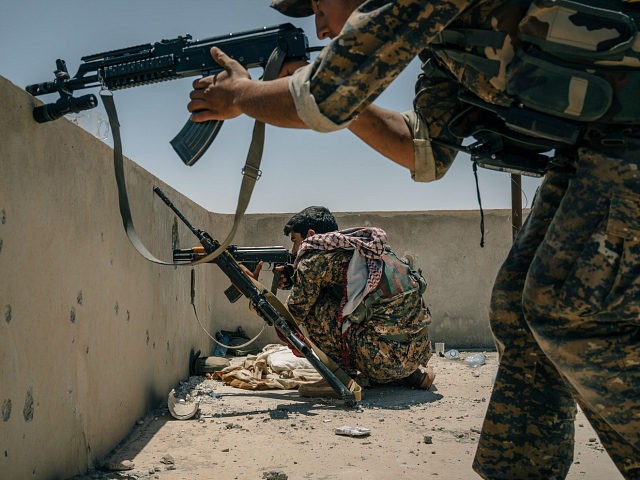The U.S. Central Command reported on Wednesday that units of the Syrian Democratic Forces (SDF) have penetrated the Rafiqah Wall in Raqqa, a landmark barrier surrounding the Islamic State’s most heavily defended positions in the city that once served as the capital of their terror state.
The Associated Press quotes the head of the London-based Syrian Observatory for Human Rights describing the SDF advance as “the most important development to date in the battle for Raqqa.” U.S. envoy Brett McGurk likewise called it a “key milestone.”
By all accounts, the advance of the Syrian Democratic Forces was an impressive military achievement, as three units were able to evade a gauntlet of booby traps and snipers to slip through the wall into Raqqa’s Old City without excessive damage to the 2,500-foot-long Rafiqah Wall. The SDF and U.S.-led coalition forces say they will do all they can to prevent harm to the 50,000 to 100,000 civilians still trapped in the city and often used as human shields by desperate ISIS fighters.
Alas, not everyone applauded this important achievement. The Associated Press quotes Kurdish news sources who said Turkey launched artillery attacks against several villages near the Kurdish enclave of Afrin, killing a woman and two children. The Turkish Defense Minister said a ground invasion of Afrin might be on the table if Afrin continues to pose a “constant security threat.”
Another Reuters report on Wednesday found the Kurdish YPG militia, which is the dominant force in the Syrian Democratic Forces alliance, preparing for battle with Turkey.
“These preparations have reached level [sic] of a declaration of war and could lead to the outbreak of actual clashes in the coming days. We will not stand idly by against this potential aggression,” YPG commander Sipan Hemo said of Turkey’s recent maneuvers around Afrin and Aleppo.
Reuters warns that clashes with Turkey could “distract the YPG from the U.S.-backed campaign to capture Islamic State’s stronghold of Raqqa.” That is one of the reasons Turkey might pull the trigger and start a war with the YPG: to prevent Kurdish forces from playing too large a role in liberating Raqqa and shaping its post-ISIS future.
ARA News reports that at least one Syrian militia unit allied with the Turkish Army is refusing to participate in an offensive against the Kurds in Afrin. The group in question, the Saladin Brigade, actually contains a large number of Kurdish fighters but has previously denounced the YPG as working against the interests of all Kurds.
A leader of the much-maligned PKK chimed in at the end of the ARA News report to allege that Russia, Iran, and the Assad regime in Damascus are working on a deal to give parts of northwestern Syria to Turkey. Other sources told the Al-Monitor news agency that Assad and his Russian patrons are trying to work the Kurds into a deal for post-ISIS Syria as well because they want to retain the Kurds as allies.
The Turks, for their part, see the YPG militia as an arm of the PKK, the Kurdistan Workers Party, a violent separatist group in Turkey. Turkey is furious that the United States treats the YPG as a steadfast ally against the Islamic State and provides it with weapons. Turkish Deputy Prime Minister Numan Kurtulmus described this relationship as tantamount to the U.S. arming a terrorist organization against one of its NATO allies. He dismissed American claims that the Kurds will return these weapons after the defeat of ISIS as fantastic.
It may be a sign of trouble ahead that YPG commander Hemo said that his militia will keep hunting down ISIS militants after the fall of Raqqa, and he also wants to establish “a political system capable of achieving real democratic transformation” in Syria.
A Washington Post correspondent traveling with SDF fighters in Raqqa noted on Wednesday that some of the commanders she met “appeared to have a more direct connection to the PKK, speaking with a Turkish accent or else refusing to say where they were from,” and often didn’t know the names of the villages they were fighting over. That account probably will not go over well with Washington Post readers in Ankara.

COMMENTS
Please let us know if you're having issues with commenting.